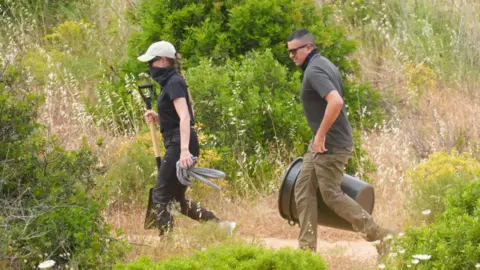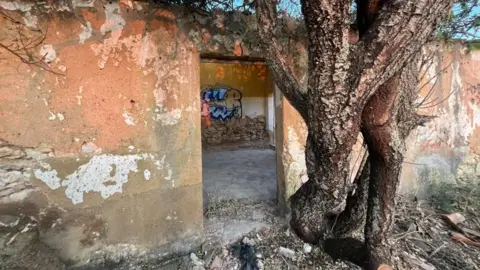UK correspondent
 PA Media
PA MediaFrom the moment I arrived in Praia da Luz on Monday the word on everyone’s lips was “closure”.
All the long-term residents of the sleepy Atlantic resort told me closure was what they were hoping for. From the English woman who lived at the time above the apartment from which Madeleine McCann disappeared in 2007, to the former neighbour of the main suspect in the case.
They all said: “We hope her family get closure”.
Of course, any chance of a really positive outcome disappeared years ago. Closure now would mean either finding Madeleine McCann’s body, or finding her living with another family, unable to remember her parents or her younger twin siblings.
But, frustrated as residents are when the world’s media return to Praia da Luz – year after year at the same time that purple flowers appear on the jacaranda trees – they do understand the unbearable pain that Kate and Gerry McCann must feel.
How that shock of realisation that Madeleine was not in her bed turned into minutes, then hours, and then days of panic. Then tortuous, unending months and years of uncertainty.
For 13 years there was no single theory as to what happened to Madeleine McCann. Did she wake up in the middle of an opportunistic burglary and have to be silenced? Was she abducted on behalf of a couple desperate for a child of their own? Had her own parents covered up her accidental death? (A theory given sufficient weight by Portuguese prosecutors that for a while Kate and Gerry McCann were officially under suspicion.)
The initial Portuguese investigation failed to preserve the scene adequately, so the opportunity to gather forensic evidence from Madeline McCann’s room at the Ocean Club was lost. Long-term residents remember joining in uncoordinated and ad-hoc searches of the town.
The Metropolitan Police investigation that began in 2011 built to a peak in 2014, with substantial searches near Praia da Luz – but they did not appear to have any identifiable suspects.
They had 60 people of interest, 38 of whom they were investigating. Portuguese prosecutors had allowed them to search only one of three sites they had asked for access to.
Everything changed in June 2020 when, out of the blue, the head prosecutor in Braunschweig in Germany, Hans Christian Wolters, said he had evidence that Madeleine McCann was dead.
Working with the Bundeskriminalamt (BKA), the German equivalent of the FBI, he said he had identified a suspect, later identified as Christian Brückner.
“The evidence is strong enough to say that the girl is dead, and to accuse a specific individual of murder,” Hans Christian Wolter said.
Brückner, who spent many years of his life in the Algarve, was a drifter, a petty criminal and a convicted sex offender. It all fitted neatly into place and it seemed that the mystery might finally be solved. Brückner’s long list of previous convictions includes ones for sexually abusing children in 1994 and 2016.
The Braunschweig prosecution team have never disclosed the extent of any evidence they have, but we do know their suspicions are partly based on a conversation an old acquaintance of Brückner’s claims they had at a festival in 2008.
Helge Busching says the topic of Madeleine McCann’s disappearance came up, and Brückner said she “didn’t scream”. Mr Busching says it was clear to him what Brückner meant.
Since 2019, Brückner has been in prison in Germany for raping a 72-year-old American woman in Praia da Luz in 2005. But he is due for release in September, or in January if he does not pay an outstanding fine.
Brückner told an RTL reporter earlier this year that he was looking forward to a “decent steak and a beer”. The concern is that he will leave the country and head somewhere with no extradition treaty with Germany, though he appears to have no money.
The Braunschweig prosecutors’ confidence was dealt a severe blow last year when they put Brückner on trial for rape and unconnected attempted child abductions.
Mr Busching gave evidence, but the court in Braunschweig acquitted Brückner and suddenly time was very short.
Mr Wolters has made no secret of the fact that he wants more evidence to charge Brückner. That is why the BKA footed the bill for the search this week in ruined farm buildings on merciless, shadeless scrubland in the rising heat of an Algarve summer.

The buildings are frequented at night by the kind of drifters and petty criminals that Brückner once was. Nearby residents told us they sometimes find looted suitcases among the ruins that have been stolen from holidaymakers.
But this week’s searches were not targeted on one specific building, so any intelligence they were based on was clearly quite vague.
It all felt a bit like a last desperate attempt to back Mr Busching’s statements with concrete, physical evidence.
In some ways this search was similar to those I have seen on previous trips. The use of shovels in the heat, digging up stone-hard ground.
But the German team were mostly targeting old farm buildings. This meant they needed a large, yellow mechanical digger to break up the concrete floors and sift through the resulting rubble.
They also made extensive use of a ground-penetrating radar, slowly pushing the device across the buildings’ floors, looking for anomalies and cavities underneath.
The Portuguese fire brigade helped on the first day, pumping out an old well so it could be safely searched. The officers were looking for traces of Madeleine McCann, or some of her clothing.
Every time I travel to Portugal for a new search it always begins optimistically. Could police find something this time? But on every occasion it quickly becomes apparent the searches are not tightly targeted. The police work always clearly based on quite vague intelligence – or just an investigator’s hunch.
Luis Neves, the National Director of the Polícia Judiciária, the Portuguese equivalent of the FBI, said at the end of the week that, “nothing is in vain, not least because doors are being closed”.
As we watched the German detectives packing away it felt like the spring of hope of a resolution that had bubbled up in June 2020 was evaporating in the thankless heat.





